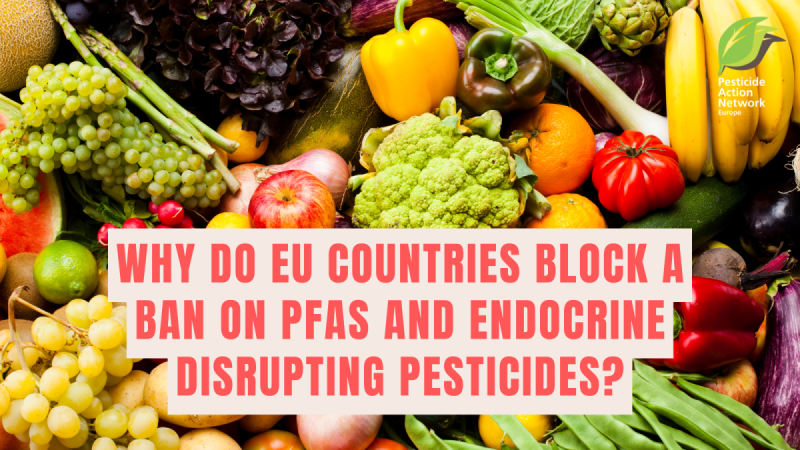The EU doubts and hesitates. Still no ban is proposed for the most frequently found PFAS endocrine disruptor in fruit and vegetables. It is high time to break this weakness and take highly necessary steps to protect health and biodiversity. On 9 and 10 July 2025, the Pesticide Committee (SCoPAFF) will gather once again to discuss whether to finally take action on PFAS and endocrine-disrupting pesticides. Since the beginning of 2025, no meaningful progress has been made on banning these harmful substances. The responsibility for this failure lies not only with the European Commission but also with Member States, many of whom continue to block or delay bans. This inaction is irresponsible. It violates EU law, and it endangers the health and rights of European citizens, water resources and ecosystems.
Ban of PFAS Flutolanil Blocked by Member States
Flutolanil is a PFAS and TFA-emitting pesticide. EFSA has identified it as very persistent. It breaks down into TFA, which contaminates crops, water, and soil. TFA is widespread in our environment and undergoing classification as toxic for reproduction, with clear evidence of developmental harm in animal studies. Yet, some Member States continue to block the ban. [1] By doing so, these governments are actively endangering our right and that of future generations to access clean water and a healthy environment.
Several other PFAS pesticides, all potential TFA precursors, are on the agenda for discussion, but still no ban is proposed. On the contrary:
- Cyflumetofen is proven to degrade into TFA in crops, yet the Commission proposes to prolong its approval. Member States that care about our health and our future should oppose this extension.
- With a –CF3 chemical group and high persistence, the herbicide penoxsulam is a likely TFA precursor. Yet, no proposal to ban the substance has been presented by the Commission since EFSA published its conclusion in October 2024.
- Penthiopyrad is a fungicide authorised on many crops including cereals, potatoes, legumes and vegetables in more than two third of Member States. It is highly toxic to aquatic organisms. Its approval period is proposed to be shortened to October 2025 following the applicant’s withdrawal of its renewal request. It is positive but we urge immediate action to withdraw all national authorisations of products containing the fungicide penthiopyrad.
Endocrine Disruptors: Four Confirmed Substances, Zero Action
Buprofezin, cyprodinil, fludioxonil, and fenoxaprop-P-ethyl have all been confirmed by EFSA to meet the criteria for endocrine disruption. These substances may interfere with human development and fertility, but also impact wildlife. Under EU law, they can not be renewed, unless negligible exposure is demonstrated. That has not been done. And yet, the Commission continues to drag its feet [2], while Member States fail to demand action. Worse, nine Member States are actively opposing the ban of fungicide fludioxonil [3], which is also a PFAS and the most frequently found candidate for substitution in fruit and vegetables. [4] Instead of banning these substances the only action foreseen by the EU pesticide committee is to extend buprofezin’s approval.
Learn more about the meeting
Learn more about our campaigns
Notes
[2] Call for a swift ban on four known endocrine-disrupting pesticides
